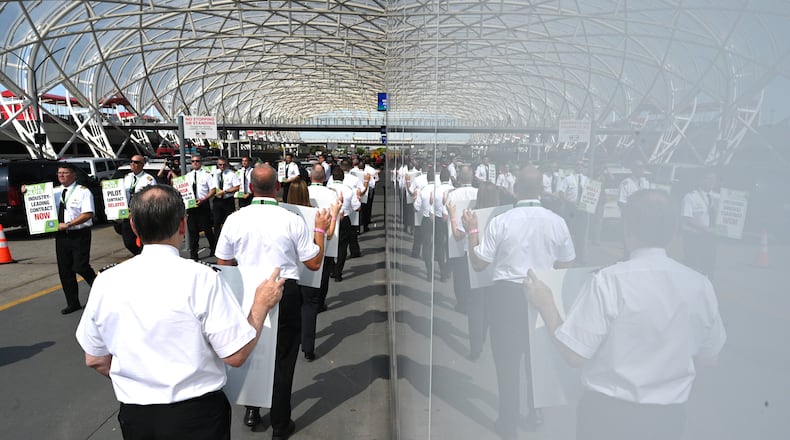The pilots union at Delta Air Lines said it has reached an agreement in principle for a new labor contract with the company, including an initial 18% pay increase.
The pilots union had picketed at airports earlier this year, and Delta pilots in October voted to authorize their leaders to call a strike if necessary.
But the agreement in principle reached Friday afternoon with Delta management signals the two sides have come to agreement on basic terms under mediated talks. Details will be hashed out in coming weeks for a tentative agreement that would be voted on by union officials, then rank-and-file members.
The early-stage labor deal comes after negotiations on a pilot contract started more than three-and-a-half years ago. Talks halted due to the COVID-19 pandemic and resumed early this year.
The union said the agreement in principle would bring a pay raise of at least 18% when the contract is signed, followed by 5% after the first year, 4% after the second year and another 4% after the third year.
Atlanta-based Delta said in a written statement that it is “pleased to have reached an agreement in principle for a new pilot contract, one that recognizes the contributions of our pilots to Delta’s success.”
“We appreciate the work of the negotiating teams and the mediator in reaching this agreement in principle,” the company said.
Delta pilots would also get a one-time payment after the deal is approved equivalent to 14% of their pay this year plus 4% of their pay for each of the previous two years. And, the agreement would ensure Delta pilots would have pay rates at least 1% higher than pilot pay at United Airlines and American Airlines.
The agreement would also bring improvements in holiday pay, vacation, 401(k) contributions and work rules. And it would allow pilots 10 weeks of paid maternity leave, two weeks of paid parental leave and reduced medical insurance premiums.
The union said that overall, the agreement would improve the value of the contract by 45%.
The deal would also further restrict Delta’s use of regional jets, a form of outsourcing with regional carriers operating flights flown by lower-paid pilots.
The pilots union’s negotiating committee told members in a memo that “there are no concessions in this agreement.”
The union negotiating committee said in its memo that “it has been an exceptionally long road to this agreement,” but called it a “generational improvement” to their labor contract.
“There is still much work which must be completed prior to making these hard-fought gains permanent,” the negotiating committee added.
About the Author
The Latest
Featured



